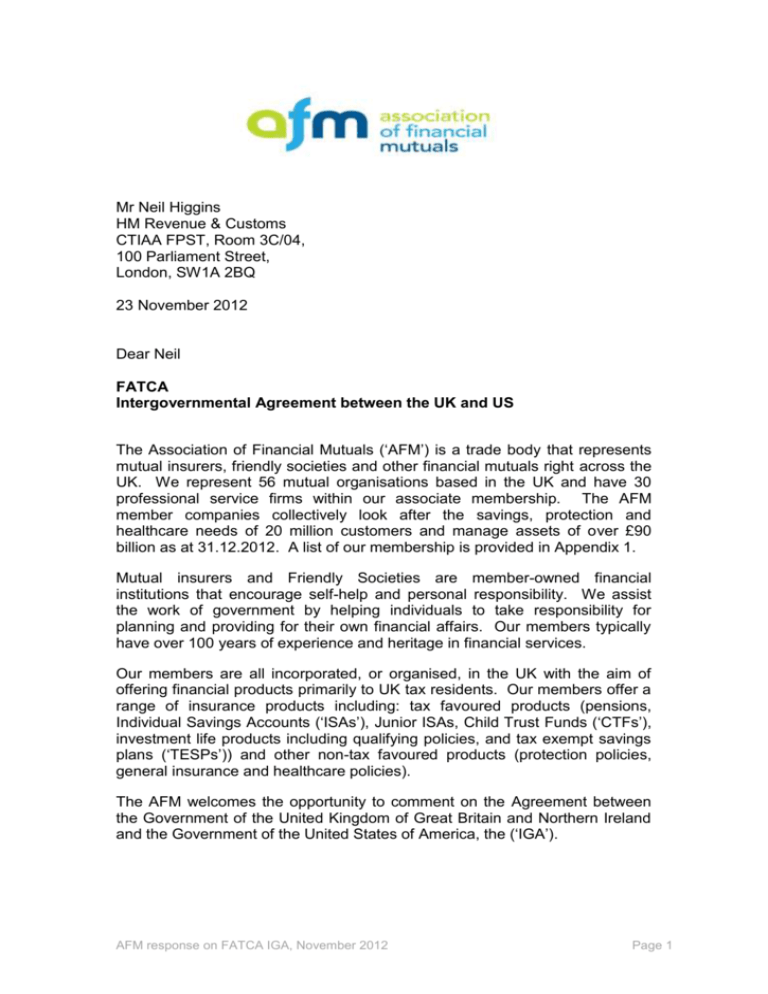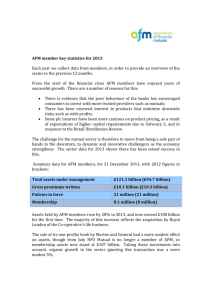AFM response to FATCA IGA - Association of Financial Mutuals
advertisement

Mr Neil Higgins HM Revenue & Customs CTIAA FPST, Room 3C/04, 100 Parliament Street, London, SW1A 2BQ 23 November 2012 Dear Neil FATCA Intergovernmental Agreement between the UK and US The Association of Financial Mutuals (‘AFM’) is a trade body that represents mutual insurers, friendly societies and other financial mutuals right across the UK. We represent 56 mutual organisations based in the UK and have 30 professional service firms within our associate membership. The AFM member companies collectively look after the savings, protection and healthcare needs of 20 million customers and manage assets of over £90 billion as at 31.12.2012. A list of our membership is provided in Appendix 1. Mutual insurers and Friendly Societies are member-owned financial institutions that encourage self-help and personal responsibility. We assist the work of government by helping individuals to take responsibility for planning and providing for their own financial affairs. Our members typically have over 100 years of experience and heritage in financial services. Our members are all incorporated, or organised, in the UK with the aim of offering financial products primarily to UK tax residents. Our members offer a range of insurance products including: tax favoured products (pensions, Individual Savings Accounts (‘ISAs’), Junior ISAs, Child Trust Funds (‘CTFs’), investment life products including qualifying policies, and tax exempt savings plans (‘TESPs’)) and other non-tax favoured products (protection policies, general insurance and healthcare policies). The AFM welcomes the opportunity to comment on the Agreement between the Government of the United Kingdom of Great Britain and Northern Ireland and the Government of the United States of America, the (‘IGA’). AFM response on FATCA IGA, November 2012 Page 1 Comments on the IGA Exempt Products We welcome the inclusion in Annex II, Section III Exempt Products of a number of key products offered by our members, specifically TESPs, ISAs, Junior ISAs and CTFs along with various pension products. The classification of these products as Exempt Products will significantly reduce the financial and administrative compliance burden for a number of our members. Clarity is requested as to whether HMRC consider indexed linked pension annuities to be classed as Exempt Products. The definition of Financial Account includes (per Article 1.1(s)(3)), ‘any Cash Value Insurance Contract and any Annuity Contract issued or maintained by a Financial Institution, other than a noninvestment-linked, non transferrable immediate life annuity that is issued to an individual and monetizes a pension or……identified as excluded from the definition of Financial Account in Annex II’. Should indexed linked pension annuities be considered to be ‘noninvestmentlinked’ then they would not be Financial Accounts and they would fall to be Exempt Products. In our opinion, classification of indexed linked pension annuities as Exempt Products would be appropriate. Further, it would give parity in treatment, from a FATCA perspective, between an individual who buys a non-indexed linked annuity with their pension pot and a second who buys an indexed linked annuity. It would also stop Exempt Products (e.g. a pension policy within a Registered Pension Scheme) converting to Financial Accounts (e.g. an indexed linked annuity) on monetisation of the pension pot. Back book due diligence requirements Annex I, II.A.3 provides that certain Preexisting Individual Accounts are not required to be reviewed, identified or reported where their sale to U.S. residents is prohibited by law or regulations of either the UK or the U.S. and UK law requires reporting or withholding with respect to insurance products held by residents of the UK. Clarification is requested as to how HMRC intend to interpret this provision in respect of qualifying and non qualifying investment life insurance policies. We set out our suggested interpretation below. Application to life insurance policies Non qualifying policies are subject to the chargeable events reporting regime. This regime provides for all gains arising on a so called chargeable event (i.e. death, maturity, surrender, assignment for consideration) to be reported to policyholders and substantial gains to HMRC. We consider that in the case of non qualifying policies the condition for ‘UK law to require reporting’ is satisfied and therefore the appropriate interpretation is that non qualifying AFM response on FATCA IGA, November 2012 Page 2 policies are excluded from the back book due diligence where the insurer does not have the required registration under U.S. law to sell into the U.S. Turning to qualifying policies; as you are no doubt aware there are very prescriptive conditions set out in the UK tax law which must be satisfied in order for the policy to be qualifying, including a premium paying term of at least 7.5 years and a minimum relationship between the sum assured and the premiums payable. Broadly, qualifying policies do not give rise to chargeable events provided they are held to term and there are no variations to the policy terms or premature cessation of premiums. There is, therefore, only limited chargeable events reporting on qualifying policies, broadly in situations where the policy terms have not been adhered to. Unlike non qualifying policies, the ‘UK law requires reporting’ condition is seemingly not satisfied for existing qualifying policies. Qualifying policies issued on or after 6 April 2013 will, however, be subject to a reporting regime, where certain details (as yet not prescribed) will be required to be reported to HMRC on an annual basis. Qualifying policies issued from 6 April 2013 are seemingly subject to a ‘UK reporting regime’. Further, an annual premium limit of £3,600 will apply to policies issued on or after 6 April 2013; if this limit is breached the policy is non-qualifying. The absence of a UK law reporting regime is therefore limited to qualifying policies incepted prior to 6 April 2013. Qualifying investment life insurance policies (like non qualifying life insurance policies) are subject to taxation under the Income minus Expenses (‘I-E’) regime. The basis of this regime is to tax the policyholder investment growth as it accrues along with the shareholder profit. Tax is levied at 20% on the policyholder element of the I-E return. An amount is then ordinarily charged to the policy funds, in accordance with the policy terms and conditions, in respect of this tax, i.e. the policyholders suffer tax during the life of the investment. Indeed this charge is described in the policy terms and conditions as a charge for tax. The tax suffered by the holder of an investment life policy (whether qualifying or non qualifying) is non-refundable should the policyholder not be a UK taxpayer or if the policyholder makes a loss on exit. Further it cannot be used to reduce any other UK tax paid by the policyholder. There is, therefore, a strong argument that the I-E tax suffered by a holder of a life insurance policy can be viewed as a form of withholding tax. The nonrefundable basic rate tax suffered, in some form, by the holder of such policies should mean that qualifying policies would ordinarily be an unattractive investment choice for non UK taxpayers. The financial risk to the IRS of excluding such policies from back book due diligence is considered to be low. We consider that in the case of qualifying investment life policies the appropriate interpretation of the IGA is that the condition for ‘UK law to require withholding’ is satisfied and therefore that qualifying investment life policies are excluded from the back book due diligence, where the insurer does not have the required registration under U.S. law to sell into the U.S. AFM response on FATCA IGA, November 2012 Page 3 We note that Annex I, II.A.2 excludes Pre-existing Cash Value Insurance Contracts and Annuity Contracts with a balance or value of $250,000 or less as of 31 December 2013 from back book due diligence requirements. Whilst this exclusion would cover the entire back book of a number of our members this is not the case for all of our members. Further, a blanket exemption from back book due diligence for specific product classes is considered preferable to applying a ‘value’ threshold. Holloway Business It has belated come to our attention that Friendly Societies writing Holloway business may fall within the scope of FATCA. Holloway business is not currently classed as an Exempt Product. Further, a Holloway Society would not satisfy the definition of a Financial Institution with a Local Client Base, and therefore be Deemed Compliant, due to the requirement of Annex II, Section II B2(d) whereby the relevant products need to be subject to either a reporting regime or withholding of tax under UK law. A Holloway policy is a PHI based product offering cash benefits in conjunction with the protection. The product can therefore have a cash value. Given the nature of these Societies, in particular their UK client base and unique nature of the product written we would welcome the opportunity to discuss with you possible ways in which the FATCA compliance burden could be alleviated for Holloway Societies. If you would like to discuss any aspect of the above do not hesitate to contact me. Yours sincerely Martin Shaw Chief Executive AFM response on FATCA IGA, November 2012 Page 4 Appendix 1: Members of the AFM •Ancient Order of Foresters Friendly Society Limited •Anglo-Saxons Friendly Society •B&CE Benefit Scheme •Benenden Healthcare Society Ltd •British Friendly Society Ltd •Bus Employees' Friendly Society •Cirencester Friendly Society Ltd •Civil Service Healthcare Society Limited •Compass Friendly Society Limited •Cornish Mutual •CUNA Mutual •Dentists and General Society •Dentists' Provident Society •Druids Sheffield Friendly Society •Ecclesiastical •Engage Mutual Assurance •Equitable Life •Exeter Friendly Society Ltd •Family Investments •Forester Life •Grand United Order of Oddfellows Friendly Society •Health Shield Friendly Society Limited •Healthy Investment •Holloway Friendly •Irish Public Bodies Mutual Insurance •Kensington Friendly Collecting Society Ltd •Kingston Unity Friendly Society AFM response on FATCA IGA, November 2012 Page 5 •LV= •Metropolitan Police Friendly Society Ltd •MGM Advantage •National Friendly • Newbridge Road Assurance Society •NFU Mutual Insurance Society Ltd •Paycare •PG Mutual •Police Mutual •Railway Enginemen's Assurance Society Ltd • Railway Friendly Society •Red Rose Friendly Society Ltd •Reliance Mutual •Royal London Insurance Group • Royal Standard Friendly Society •Scottish Friendly Assurance Society Ltd •Sheffield Mutual Friendly Society •Sovereign Health Care •Sunderland Marine Mutual Insurance Company •Teachers Assurance •The Children's Mutual •The Oddfellows •The Shepherds Friendly Society Ltd •Transport Friendly Society Ltd •UIA (Insurance) Ltd •Veterinary Defence Society •Wesleyan Assurance Society •Wiltshire Friendly Society Limited AFM response on FATCA IGA, November 2012 Page 6






